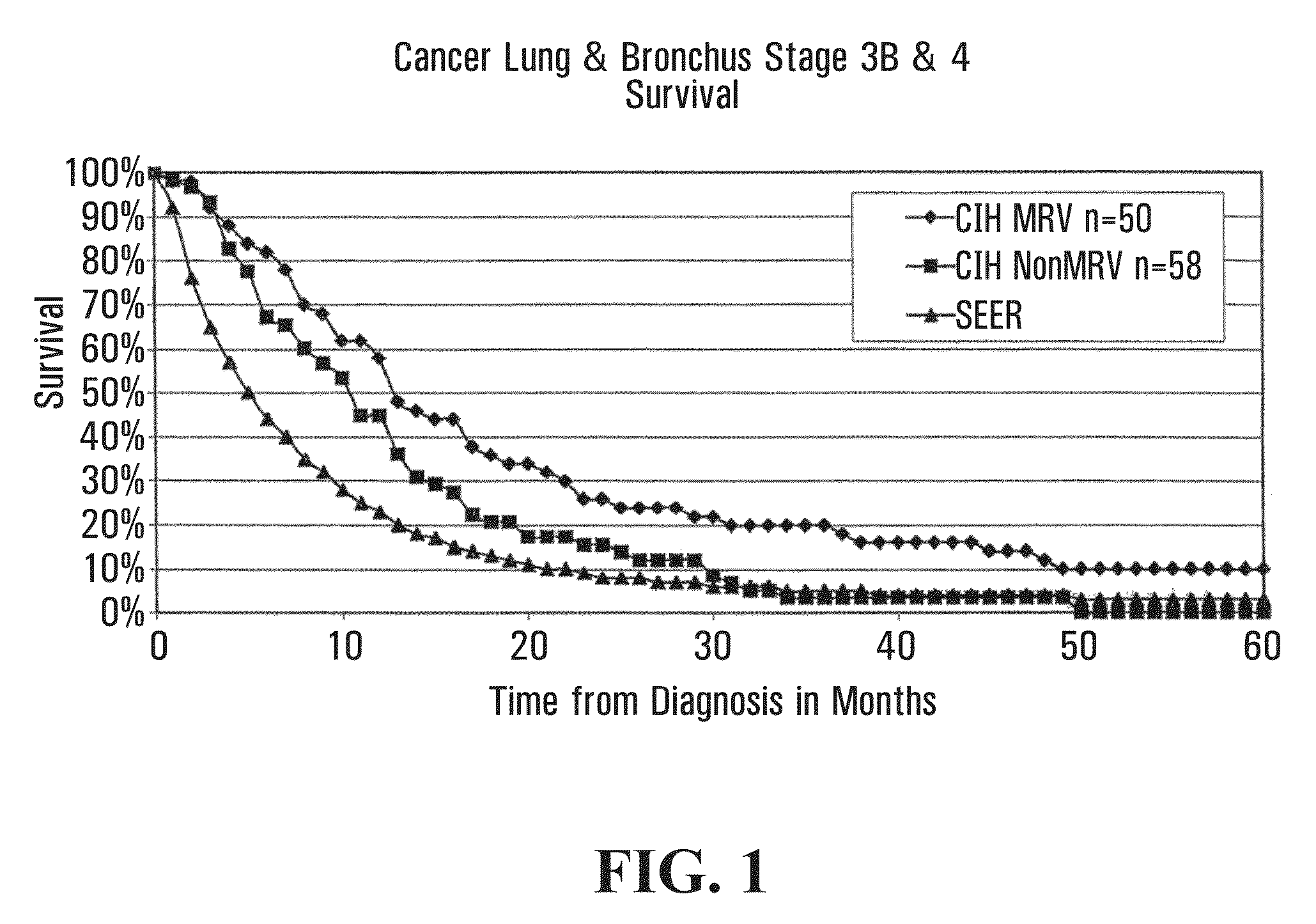Personalized site-specific immunomodulation
a site-specific immunomodulation and immunomodulation technology, applied in the field of immunotherapy, can solve the problems of limited efficacy, relatively ineffective, and directed to both surgical treatment and radiation therapy, and achieve the effects of reducing the risk of cancer
- Summary
- Abstract
- Description
- Claims
- Application Information
AI Technical Summary
Benefits of technology
Problems solved by technology
Method used
Image
Examples
example 1
Clinical Studies
Bacterial Compositions
[0310]Five killed bacterial compositions have been used to treat a wide variety of cancer types and stages in blinded studies, as follows:[0311]1. The Bayer Corporation MRV™“Bayer MRV” (Hollister-Steir Laboratories, Spokane, Wash., U.S.A.), containing the following bacterial species:
[0312]
Organisms per mlStaphylococcus aureus1200 million viridans and non-hemolytic Streptococci200 millionStreptococcus pneumoniae150 millionMoraxella (Neisseria) catarrhalis150 millionKlebsiella pneumoniae150 millionHaemophilus influenzae150 million
[0313]This vaccine was produced for the following indications: rhinitis, infectious asthma, chronic sinusitis, nasal polyposis and chronic serous otitis media. Cancer treatment was not indicated as an intended use for this vaccine. The vaccine also included the following ingredients: 0.4% phenol, 0.9% NaCl, trace amounts of brain heart infusion (beef), peptones, yeast extract, agar, sheep blood, dextrose, and sodium phosp...
example 1a
[0330]This section relates to primary cancer in the lung, or metastases to the lung, treated with microbial pathogens of the lung, such as endogenous respiratory bacteria flora.
[0331]Patients qualified for the lung cancer study if they were initially diagnosed with stage 3B or 4-lung (inoperable) cancer. Lung cancer staging was performed using standard methods as for example described in AJCC: Cancer Staging Handbook (sixth edition) 2002; Springer-Verlag New York: Editors: Fredrick Greene, David Page and Irvin Fleming, or in International Union Against Cancer: TNM Classification of Malignant Tumors (sixth edition) 2002; Wiley-Liss Geneva Switzerland: Editors: L. H. Sobin and C. H. Wittekind. For example, lung cancers may be classified as follows:
TNM Lung Clinical and Pathological Classification
T Primary Tumour
[0332]TX Primary tumour cannot be assessed, or tumour proven by the presence of malignant cells in sputum or bronchial washings but not visualized by imaging ...
example 1b
Breast Cancer with Metastasis to the Bone or Lung
[0368]The most common cause of both breast infection and bone infection is Staphylococcus aureus. Accordingly, in one aspect of the invention, an antigenic composition comprising antigenic determinants of S. aureus may be used to treat breast cancer with metastases to the bone. The remarkable case of Patient R (PtR), treated with a Staphylococcus aureus vaccine, set out below in the Case Reports, illustrates the efficacy of this approach to treating breast cancer with bone metastases. As illustrated in FIG. 6, in a cumulative series of 52 patients, survival of breast cancer patients with metastases to bone and / or lung treated with MRV (n=19), which contains Staphylococcus aureus, was better than the survival of patients not treated with the MRV vaccine (n=33):
[0369]
% survival MRV patients% survival non-MRV patients10 months95%76%20 months74%61% 5 years26%18%
[0370]In accordance with the foregoing results, one aspect of the invention in...
PUM
 Login to View More
Login to View More Abstract
Description
Claims
Application Information
 Login to View More
Login to View More - R&D Engineer
- R&D Manager
- IP Professional
- Industry Leading Data Capabilities
- Powerful AI technology
- Patent DNA Extraction
Browse by: Latest US Patents, China's latest patents, Technical Efficacy Thesaurus, Application Domain, Technology Topic, Popular Technical Reports.
© 2024 PatSnap. All rights reserved.Legal|Privacy policy|Modern Slavery Act Transparency Statement|Sitemap|About US| Contact US: help@patsnap.com










